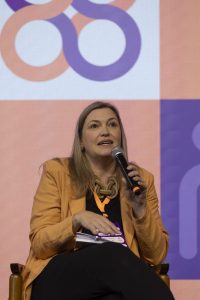Social investment is about people. Prevention and care are also about people.
At the 13th Brazilian Philanthropy Forum, with the theme ‘Interlaced Philanthropy’, the session ‘Emergency and Resilience: philanthropy strengthening communities’ discussed the imminent climate and sanitary crisis, talking about how emergency funds and donations can ease and prevent possible disasters. Present in the session were Giuliana Ortega (Sustainability Director at RD – Raia Drogasil), Karine Ruy (General Coordinator of the Gerações Foundation) and Marijana Sevic (Head of International Strategic Partnerships at Charities Aid Foundation), as well as Vinicius Barrozo (Social Value Analyst at Globo and responsible for the donation platform ParaQuemDoar) as the moderator.

The discussion about the recent climate and sanitary actions, besides the increase in armed conflicts, highlighted the urgency of creating plans, strategies, and investments that can prevent possible crises. Karine Ruy talked about the work made by Gerações Foundation in the floods that hit Rio Grande do Sul – a Brazilian state – in May of 2024, leaving 497 municipalities impacted and 150,000 people displaced. The institution created ‘Fundo Comunitário Porto de Todos’ to aid those affected by the event. She emphasized theimportance of listening to the demands of the community for the reconstruction and mitigation of risks, as she says in her speech:
‘We understood that our role at that moment was to be a coordinating organization, building bridges between different actors in the ecosystem that had this operational capacity, but mainly identifying – through a very careful hearing process – what were the demands of the communities and territories’, she said.
Another relevant aspect commented was the role of Charities Aid Foundation (CAF) in countries such as Ukraine and Morroccos, that faced different types of emergencies: the first, an armed conflict, and the second, an earthquake. Marijana Sevic commented on the demand for donations in these cases, which are quick and must be met efficiently and safely, an activity CAF has expertise in operating in more than 170 countries.
Another highlight was the actions taken by RaiaDrogasil during the COVID-19 pandemic. Giuliana Ortega shared that, at the time, the company created an investment fund, together with the Institute for the Development of Social Investment (IDIS), to offer infrastructure to small and medium hospitals, ensuring that those structures would endure long after the crises. The company also supported mass vaccination in different cities through the ‘United for Vaccination’ movement. These actions led RaiaDrogasil to reflect on the donation of their own resources which made them establish their own Theory of Change, highlighted by Giuliana:
‘Since 2021, we have established a policy and started investing 1% of our net profit in health actions in communities and society in general. […] Therefore, we had these new resources to think about and so we decided to institute our Theory of Change because the resources were increasing. We were going to channel this effort, and our main goal was to promote health’.
Further on in the session, Vinicius Barrozo presented the platform Para Quem Doar (For Whom to Donate, in english), which had a key role in integrating and directing donations during the pandemic and the floods in Rio Grande do Sul. The app connects donors and organizations simply and securely. In order to encourage giving culture, a partnership between Globo, IDIS, and Instituto MOL was announced through the ‘Find Your Cause’ campaign, which helps the donner identify the areas most aligned with their own values and convictions.
However, there are still some loose ends to interlace, such as the lack of commitment to donations and the delay of the planning and creation of emergency lines for climate and sanitary crises. It is crucial to encourage a giving culture that goes beyond disasters; to have a strategic view for the middle to long-term reconstruction period, when the initial commotion subsides and, therefore, so do the investments; and to highlight the crucial role of communication in emergencies, announcing in a clear and captivating way the purpose of the donation. These paths can help to untangle some resistant knots and strengthen ambition and strategies.
Beatriz Barros is the project intern at IDIS.



Comments (0)